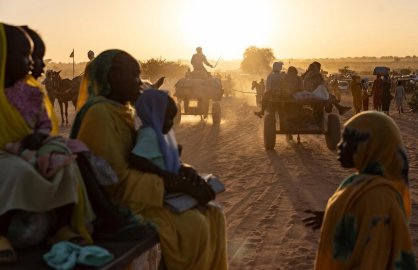Understanding the UNHCR’s Projections for Resettlement in 2026
The United Nations High Commissioner for Refugees (UNHCR) has recently released a startling estimate that highlights the dire state of global displacement. According to their projections, 2.5 million people will require resettlement in 2026. This figure underscores the urgent need for comprehensive immigration reform and humanitarian assistance worldwide.
The Current Landscape of Displacement
Displacement is a pressing humanitarian issue affecting millions across the globe. Factors such as armed conflicts, persecution, and environmental disasters contribute significantly to this crisis. The UNHCR’s projections are a call to action, emphasizing the need for countries to enhance their resettlement programs and humanitarian support systems.
- Global Conflicts: Ongoing conflicts in regions like Syria, Afghanistan, and parts of Africa have resulted in significant displacement.
- Environmental Changes: Climate change is increasingly becoming a driver of displacement, with natural disasters forcing people to flee their homes.
- Persecution: Ethnic, religious, and political persecution continues to displace individuals, creating a need for safe havens.
Resettlement Needs and Challenges
The UNHCR’s estimates highlight the challenges faced by refugees and displaced individuals seeking safety and stability. Resettlement is crucial for those unable to return to their home countries due to the ongoing threats they face. However, the process is fraught with challenges, including:
- Bureaucratic Hurdles: The resettlement process can be lengthy and complicated, often requiring extensive documentation and interviews.
- Limited Opportunities: Many countries have restrictive immigration policies, limiting the number of refugees they can accept.
- Funding Shortages: Humanitarian organizations often face financial challenges that hinder their ability to provide adequate support for resettlement initiatives.
The Role of Governments and Organizations
Governments and international organizations play a critical role in addressing the needs of displaced individuals. The UNHCR works in collaboration with various entities to facilitate resettlement and provide essential services to refugees. Here are some key areas where action is needed:
- Expansion of Resettlement Programs: Countries should increase their commitment to resettling refugees, creating pathways for individuals in need.
- Strengthening Humanitarian Assistance: Enhanced funding for humanitarian programs is essential to support displaced populations effectively.
- Public Awareness Campaigns: Educating the public about the challenges faced by refugees can foster a more supportive environment for resettlement initiatives.
Implications for Immigration Policies
The UNHCR’s projections for 2026 serve as a crucial reminder of the need for effective immigration policies. The upcoming years will require a concerted effort from governments worldwide to address the growing humanitarian needs. This may include:
- Comprehensive Immigration Reform: Countries must reassess their immigration laws to facilitate the resettlement process.
- Collaboration with NGOs: Partnering with non-governmental organizations can enhance the support provided to refugees.
- Utilizing Technology: Implementing efficient systems for processing applications can streamline the resettlement process.
The Importance of Community Support
Communities play a vital role in the successful integration of resettled individuals. Local support can significantly impact the well-being and stability of refugees. Here are some ways communities can contribute:
- Welcoming Initiatives: Creating programs that help refugees acclimate to their new environment fosters a sense of belonging.
- Employment Opportunities: Assisting refugees in finding jobs can aid in their self-sufficiency and economic stability.
- Cultural Exchange Programs: Encouraging interactions between local residents and refugees can promote mutual understanding and cooperation.
Conclusion
The UNHCR’s projection that 2.5 million people will need resettlement by 2026 is a stark reminder of the ongoing refugee crisis. As we look ahead, it is imperative for governments, organizations, and communities to collaborate and create effective solutions to support displaced individuals. By enhancing resettlement programs, improving immigration policies, and fostering community support, we can work towards a future where refugees find safety, stability, and a chance to rebuild their lives.
In this critical time, it is essential to stay informed about immigration news and advocate for policies that support those seeking refuge. The collective effort to address these challenges can make a significant difference in the lives of millions around the world.










